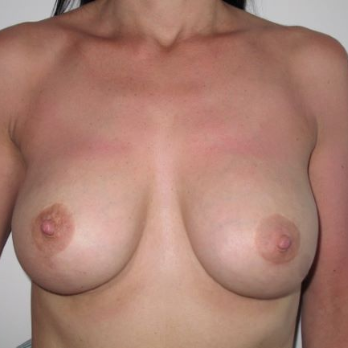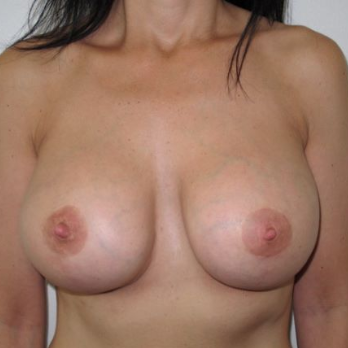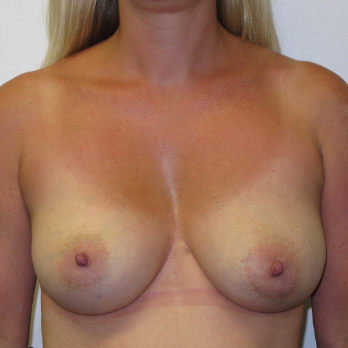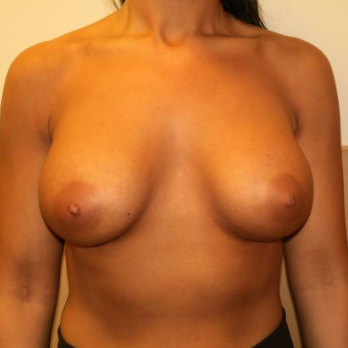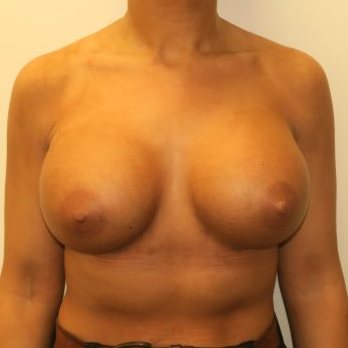
Breast Implant Replacement
Breast implant replacement will need to be considered at some point in all patients who have had implants. The time period before considering a replacement varies due to a number of reasons but eventually an implant exchange will be needed . On average it is often cited that implants tend to last about 10 years. However some patients may end up requesting an implant exchange for other reasons before this time.
These reasons include:
- Implant rupture
- Capsular contracture
- A request for size change
- Rippling of the implant
- Exchanging the pocket to above or below the muscle
Breast Implant replacement may be straightforward if a simple swap of implant is required with a similar sized implant in a patient whose breasts have not changed very much over the years. More commonly however , factors due to a change in breast shape or thinning of the tissues after pregnancies can make the procedure more complex. Other factors which can make the procedure more complicated is the presence of capsular contractures and if a change to the implant pocket is required.
All of these factors will be assessed at the time of your consultation and Mr Chana will discuss very carefully the options which are best suited to meeting your expectations.
The breast consultation
It is extremely useful to bring details of the size (volume in CCs) and shape of your previous breast implants. If you do not have these details it is advisable to contact your previous surgeon to obtain this information. This is extremely helpful but not mandatory to plan the replacement surgery.
At consultation Mr Chana will discuss the reasons that you may require implant replacement in detail and carry out an examination to determine the most appropriate procedure.
In situations where a size increase is requested shaped sizers are used on top of your breasts so that you can view yourself in a mirror with a bra or clothing and get an idea of the increase in size. The nurses in the clinic will help with sizing with sports bras and T- shirts being available but you may want to consider bringing your own clothing and sports bra to help you in the decision making process.
In situations where a size decrease is requested it is not possible to undergo a sizing exercise but Mr Chana will discuss in broad terms the degree of volume reduction that will aim to achieve the desired reduction in cup size.
Mr Chana will also be examining you also to determine if there is a capsular contracture or any other factors such as thin breast tissue or even a droopy breast that may need additional surgery to achieve the best results.
The breast implant replacement procedure
The surgery is performed under general anaesthetic and your stay in the hospital is a day case for a straightforward implant swap but if adjunctive procedures are required you may need a one night hospital stay.
You are likely to have a scar under the breast from your previous breast implant procedure. This scar is removed and the same opening used again to remove the previous implants. Any surgery to remove a capsule or to change the pocket for the implant is carried out through the same incision. Bear in mind that increasing the size of an implant or techniques to remove the capsule en-bloc may need a slightly longer incision.
Once the previous implant is removed a new implant is inserted using a sterile technique and the incision closed with deep stitches and skin sutures . A straight implant swap does not require a drain but any extensive surgery to the pocket or capsulectomy will need a drain. The drain is removed before you go home.
The recovery after breast implant replacement
The surgery is not too painful and many patients find that replacement surgery is less painful than their first surgery since the pocket for the implant has already been made. Any discomfort tends to be easily controlled with mild painkillers. It is important not to take any non-steroidal( aspirin-like ) painkillers. Painkiller and antibiotics after the surgery will be provided for you to take home.
You will require to rest for a few days and restrict your upper body movements. If your job is sedentary you can go back to work after a week but two weeks off work if your job is more active.
Gentle walking is allowed in the first couple of weeks but no strenuous physical activity or exercise for approximately 6 weeks.
You will need to wear a sports bra with no underwire for 6 weeks.
The best results are seen after 3 to 6 months as the swelling slowly subsides and the new breast implants settle into the pocket.
The risks of breast implant replacement
As with all surgical procedures, there are risks. Infections are a rare risk which can be reduced by antibiotics which are prescribed for you. Excessive bleeding or a haematoma (blood clot) around the implant is unusual, but possible. If this occurs in the first few hours after surgery it will need a further operation to remove and stop the excess bleeding.. Aspirin or aspirin-like medication (non-steroidal, anti-inflammatory tablets) increase this risk and therefore must not be taken.
There scars will initially be red following surgery, but these fade over a period of a year. The scars may be slightly longer if you have had an exchange to larger implants. Similarly a large implant can result in the scar riding a little higher onto the breast and it many not be in the crease.
Most patients will experience a change in nipple sensation after surgery. Some or all of it will return during the recovery period, but they may remain tender to the touch for a number of weeks. In a few rare cases, loss of sensation can be permanent. This may be more likely with repeat surgery which can disrupt the nerves more than the first procedure.
Some breast asymmetry is also normal, which very occasionally can be made more noticeable after a breast augmentation. Movement or displacement of the implant can occur, even after surgery. Although highly unusual, in most cases it can be corrected although perfect symmetry is nnever attainable.
In up to 10% of women, the layer of tissue or 'membrane' around the implant can become firm and hard. This is called a capsular contracture and this may be one of the reasons that an implant replacement was required. The risk of capsular contracture is present each time after breast implant surgery even if the capsule has been removed it can reform with the next set of implants and again cause a contracture.
There have been cases where over time a disruption in the shell of the implant may occur due to wear and tear. This can result in silicone leakage but with modern cohesive gel implants the silicone tends to remain in shape and stay within the capsule around the breast implant. A further replacement surgery will then be needed.
Medical silicone is used safely breast implants and is not associated with breast cancer. However there is another form of cancer which is a type of lymphoma called ALCL which has recently been associated with implants. This is very rare indeed with a currently cited risk of 1 in 24,000. It is associated with textured implants . Mr Chana will discuss very carefully all the options available for implant replacement and arrive at a decision with your agreement. You can read more about ALCL here
Having needed a breast implant replacement you will be aware that implants are not permanent and you will need a further replacement n the future. Most implants have a lifespan of around 10 years, although some patients have been known to have had them for 20 years with no complications. Mr Chana recommends that you keep a long term check on your implants. An MRI scan is advisable, particularly as you approach the five to ten year mark.
You will also be given a detailed information leaflet on breast augmentation with all the detailed risks prior to your surgery.
-
Breast Implant replacement from 240cc to 330cc
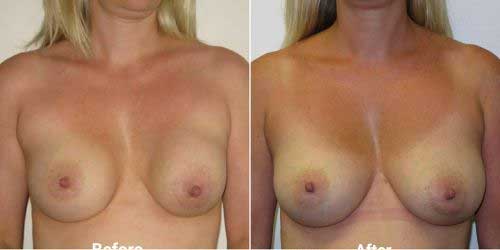
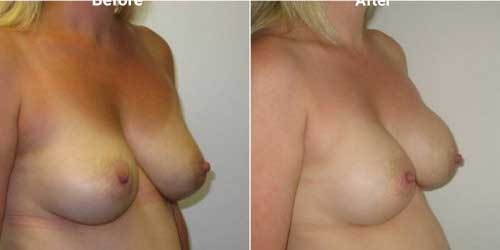
This patient had implants for several years and had developed a capsular contracture on her left breast which can be seen on the photo above where the left breast is smaller and looks contracted with the round edge of her implant visible. Larger implants were used and the implants exchanged from over to under the muscle resulting in a much improved shape and proportions
-
Exchange of 260cc to 460cc implants
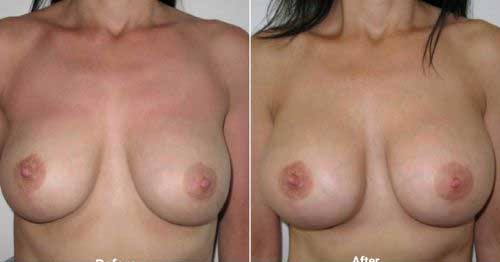

This patient requested an exchange of her implants in order to increase her cup size. The implants were exchanged from 260cc to 460cc which has taken her from a C cup to DD cup.

